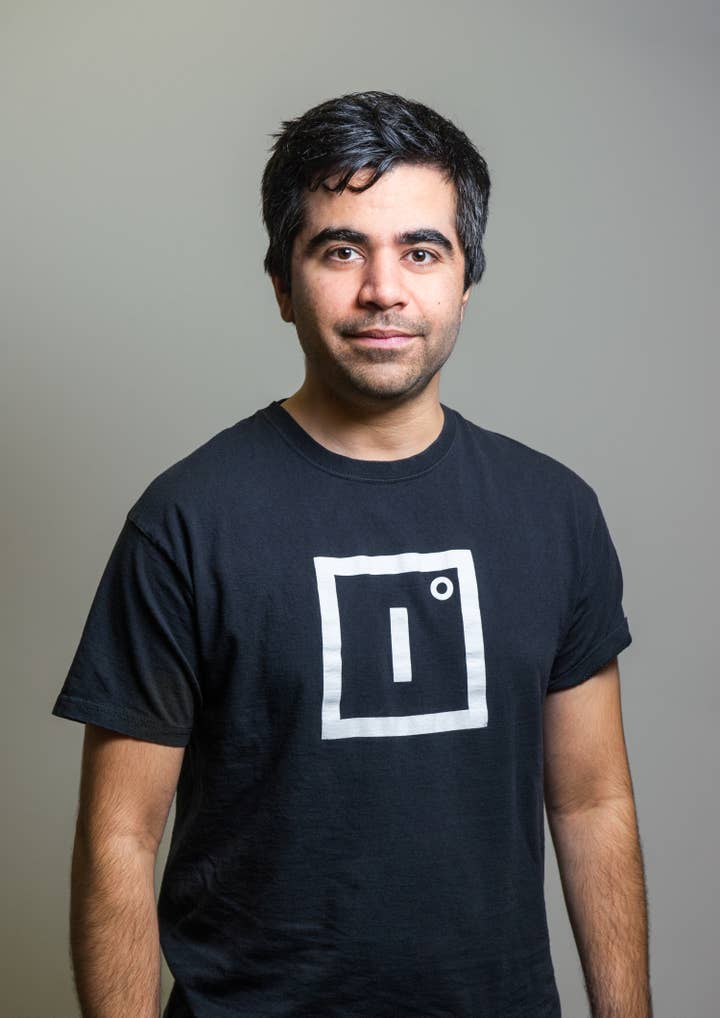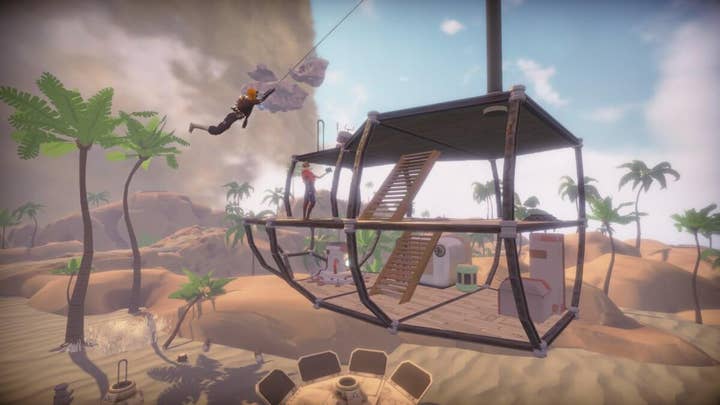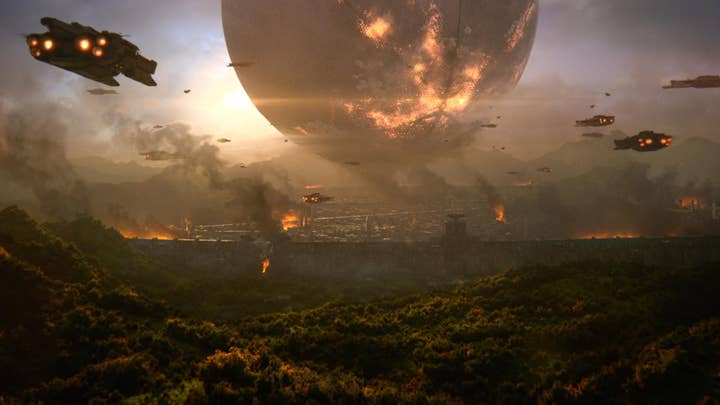“This is as important as AI or space travel” - Why Improbable is worth over $1bn
We speak to the CEO of Britain's most talked about start-up
Friday morning, I head down the stairs, flick on the kettle, turn on the radio and over the speakers comes the news.
"A London-based video games company has received $500m in investment from Japan," said the BBC anchor. "Improbable, which specialises in technology, is now one of the UK's most valuable start-ups worth over $1bn."
By the time I reach my desk, I've already had an email from mum linking me to the story. And over the course of the day, almost every national publication had a piece about this mysterious, London company and the Cambridge graduates that formed it.
Outside of major hardware and software launches, these moments are rare in video games. Improbable, and its mission to revolutionise virtual worlds, had become headline news. It was exciting for us, so how did the company feel about it?
"Not great," says CEO Herman Narula candidly.
"We are in this to try and make something meaningful that we care about. If exposure is going to help developers, gamers, everybody see that this is viable and can happen, then great. But we are not particularly interested in exposure for its own sake. We tend to be pretty introverted here."
The investment Improbable had received was $502m from SoftBank, which didn't even buy the Japanese conglomerate a 50% stake in the business - this told journalists that Improbable had been valued at over $1bn. That seems like an obscene amount of money for a company still in its fledgling years.

"I wouldn't want to comment on any specific value, and these things tend to get sensationalised in a lot of ways," Narula continues. "Our long-term objectives, and it is long-term, is to literally create other worlds. Not just in the context of gaming, but in the context of being able to solve really important problems. This core problem of massive distributed systems and engaging large-scale virtual worlds, is as important and significant as AI or space travel. It is just as important for the future of what our experience will be like as human beings in the world, and how we are going to solve some of the most pressing problems that we have. So that valuation reflects the overall opportunity that exists within this space.
"I'm not pretending to anyone that we are there yet. But I am hoping that this momentum and investment will galvanise the ecosystem to think that these things are valuable. It is good for the industry that we received this."
So is that why Improbable is one of the most highly-valued video game start-ups... because it's not really a video game company at all?
"No, no, no," Narula defends. "A lot of people just can't believe that we think games are important. They are incredibly important and they're going to be more important. Hypothetically, one day, if 100m, or 1bn, people entered simultaneously into a virtual world, that would cease to be a game, that would be a country. That would become something of incredible importance to the world and the experiences that people have. I'd also say that a lot of the other areas that we are impacting - infrastructure simulation and things of that nature - are applications that are quite game-like. It is gaming that is our central focus, core vision and direction. All of the founders are passionate gamers, that is what we talk about and think about. It is great that our raw technology has applications in many different areas, but for us it is gaming first."
"One day, if 100m, or 1bn, people entered simultaneously into a virtual world, that would cease to be a game, that would be a country"
Narula's passion for games is apparent in almost every answer. The whole reason he wanted to create SpatialOS (the technology designed to power these large online worlds that can house a huge number of people) was down to his love for these games.
He continues: "Virtual worlds has always been described in the 1980s and 1990s in terms of escapism, but that kind of misses the point. It's not about retreating into a game world and escaping from the real one. it's about becoming more empathetic, smarter and having experiences you wouldn't otherwise have... being richer. We talk about people being well travelled, and we say that as if it's a good thing. So being able to explore other worlds will surely only enrich human experience."
It all sounds exciting, but a huge sum of money does bring with it a certain level of expectation.
"We have been very careful to tell people that everything we are doing is going to take a while," Narula tells us. "There is some amazing stuff that developers can do with SpatialOS right now, but our long-term vision is even bigger. I guess what we are asking is for developers to start these relationships early, so we can build with them. What is key for us is to be as transparent as possible. Our SDK is out there. Everyone can download it and play with it. In fact 1,000 people have done that in the last three days.

"But far from managing expectations, I want the industry to believe in online games again. We went through a bit of a nuclear winter, with MMOs in particular, and part of that was technological, part of that was gameplay and part of that was consumer expectation. But now the time is right to revitalise the notion of worlds where actions can be meaningful and where we can create these experiences that we've dreamed of. I am hoping that with us having this cash and having this stability, it's going to make people excited about investing in that."
Indeed, in the wake of World of Warcraft, the expectation was that MMOs would soon become a dominant force in video games. Yet nothing ever topped Blizzard's now iconic title, and the genre faded. So what went wrong that Improbable is proposing to fix?
"It wasn't just technological, it was also a question of gamers being ready to really commit to virtual worlds," Narula explains. "Now we are at a different point. There is a much larger market of people who want deeper immersive experiences. Technologically, the big limiting factors were cost and difficulty in building anything. This means that the cycle times were so long that no one was really willing to innovate. If you are going to spend four years and up to $50m building an online game, you can't afford to take risks. What we are hoping to do with technology like Spatial, is make it possible for people to do that a lot cheaper and a lot quicker, so they can take experiment more. And maybe we will start to see some of the vibrant innovation that we have seen elsewhere.
"But it's also technological. Fundamentally, you can't create deep, meaningful experiences just with sharding and scripted content. Those things are valuable, but you need a way for a world to really come to life. That means worlds with their own ecosystems and their own economies, where things are persistent and people can play high fidelity gameplay. And I think people will hopefully see some of the early stuff that we have already been working on to show what we mean."
"If you are going to spend four years and up to $50m building an online game, you can't afford to take risks."
It's not entirely fair to say the MMO genre died away. Like many things in this industry, the market simply evolved in ways we hadn't anticipated. Games like Destiny, GTA Online, PlayerUnknown's Battlegrounds... these are all giant virtual worlds inhabited by huge numbers of players, and they're also some of the biggest and most talked about titles on the market.
It's clear that triple-A studios remain galvanised by virtual worlds, yet Improbable's partners are primarily mid-sized studios (the recently announced Jagex the notable exception). Narula hopes that will now change.
"For a lot of larger, more established companies - several of which we are now engaging with - they take longer to evaluate and cycle through decisions like this. But absolutely, we want to be working with them. We don't think that anything we are doing is a replacement for the great tech teams that exist within these companies. But with us partnering with them, it will be possible to do even more. I am an amazing fan of Destiny, and I salivate at the prospect of what a studio like Bungie could do in partnership with us. That would be a holy union absolutely worth making happen someday."

Of course one thing Improbable could do, with over half a billion dollars in the bank, is build a game of its own.
"We are not ruling out the idea of content investment or content partnership," Narula says. "But right now our responsibility is to build the best product we can for our customers, and really mature the technology. There will be things that we will try to do to supercharge the ecosystem, so watch this space. We did a partnership with Google, which subsidises hundreds of developers using Spatial. We can perhaps take those things further."
Narula remained tight-lipped on what exactly that $502m is going to be spent on. He said there was work to be done on Spatial - particularly in terms of Unreal integration, and making it easier for developers to use. He also wants to take the tech to new platforms such as mobile. Yet all of this was likely in the pipeline before SoftBank arrived with its money.
"To build a really significant company that is going to impact the world of games and immersive universes, you need to target Asia and the West at the same time."
SoftBank - which acquired ARM for almost £25bn last year - was one of several suitors interested in Improbable. But it was a clear favourite to Narula and his fellow founders, partly due to its heritage in the East.
"It is not just a Western games industry," he says. "We can't be thinking about Asia later and the West now. To build a really significant company that is going to impact the world of games and immersive universes, you need to target Asia and the West at the same time."
Despite the sum of money, SoftBank didn't buy a majority stake in Improbable. And Narula says that it was important that the company retained its independence.
"We have a vision and we want to see it through. We are not in this to flip the company or make a quick buck. We did this because we want to play the things that people are going to make on top of Spatial. I will consider it mission accomplished when I can enter into an immersive world and feel like that experience is as meaningful as the real world. That is what I am here to make happen. We didn't feel like we could make that commitment unless we remained independent.
"The other side of it is that we think we can get to a very, very large scale, and becoming a subsidiary today of anyone would be a mistake. It would prevent us in realising our ambitions."
Independence also means it can retain a certain Britishness, says Narula. "It would be great if someone could create a massively successful British platform company. If that could be us, so much the better, but it is something that we want to make possible as well."
Yet the games industry in the UK remain concerned over Brexit. Leaving the European Union is something that could impact the flow of talented game makers coming into the UK. However, Narula is bullish.
"We don't know what Brexit really means yet," he concludes. "We will obviously keep a close eye on it, and as it becomes relevant to us, we will look to react. But we are fundamentally optimistic. Britain is where a large amount of the most famous innovation in the games industry and the tech sector has happened. We are proud to be British and to be based here."
